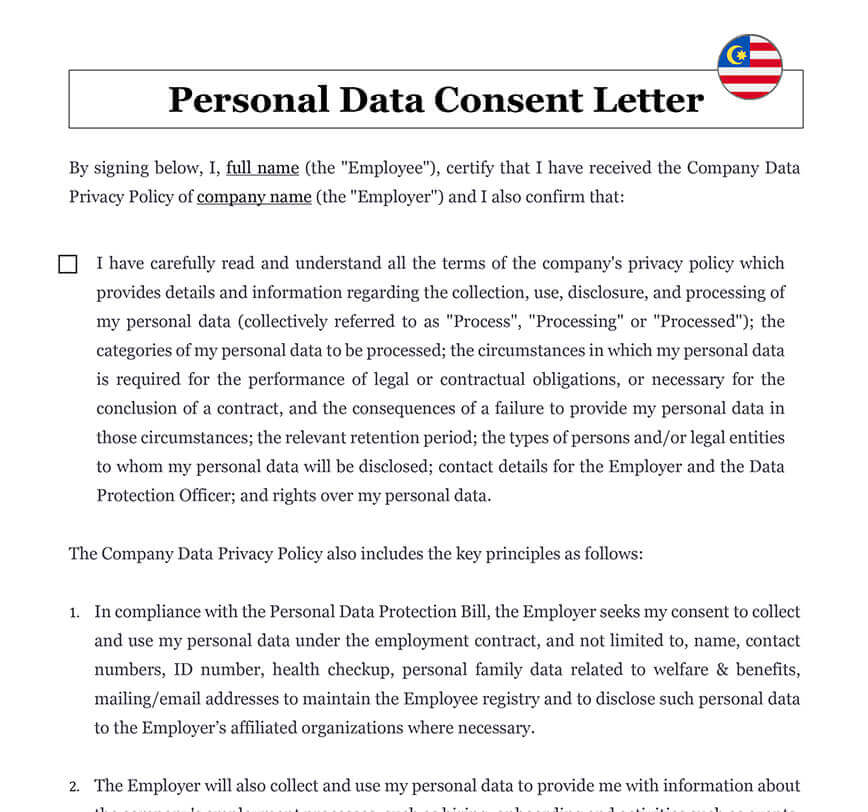Ready to use legal template
Drafted by experienced lawyers
Compliant with Malaysian law
Ready to use legal template
Drafted by lawyers
Compliant with Malaysian law
Home › Intellectual property › Personal data protection
Learn more about Personal Data Protection in Malaysia
Personal data protection in Malaysia is governed by the Personal Data Protection Act (PDPA) which was enacted in 2010. The PDPA regulates the collection, use, and disclosure of personal data, including intellectual property, by businesses and organizations operating in Malaysia. It also gives individuals the right to access and request correction of their personal data, and the right to be informed of any data breaches. Companies are required to appoint a Data Protection Officer (DPO) to ensure compliance with the PDPA, and to implement appropriate security measures to protect personal data. Penalties for non-compliance can include fines and imprisonment. The PDPA is enforced by the Personal Data Protection Commissioner and the enforcement of the act is one of the key focuses of the Government of Malaysia to ensure citizens personal data is protected.
Table of contents
-
What does the personal data protection act (PDPA) regulate?
-
How does the PDPA protect individuals' personal data in Malaysia?
-
What are the obligations of companies and organizations under the PDPA?
-
What are the rights of individuals under the PDPA?
-
How are the PDPA and its regulations enforced?
-
What penalties can be imposed for non-compliance with the PDPA?
-
What is the role of a Data Protection Officer (DPO)?
-
How does Malaysia's Personal Data Protection Act compare to similar countries
What does the personal data protection act (PDPA) regulate?
The Personal Data Protection Act (PDPA) regulates the collection, use, and storage of personal data. It applies to both public and private sector organizations. It sets out the rights of individuals with respect to their personal data and the obligations of organizations that process personal data.
The PDPA is intended to protect the privacy of individuals and give them control over their personal data. Organizations must comply with the PDPA to avoid penalties and legal actions.
The key provisions of the PDPA include:
1. Obligations of data controllers: Organizations that collect, use, or store personal data are considered data controllers, and are required to comply with the PDPA. This includes obtaining consent from individuals before collecting their personal data, and providing them with access to their personal data on request.
2. Data processing principles: Organizations must ensure that personal data is processed in a lawful, fair, and transparent manner. They must also ensure that the data is accurate, complete, and not excessive for the purpose for which it is collected.
3. Data security: Organizations must take appropriate technical and organisational measures to protect personal data against unauthorised or accidental access, processing, erasure, loss or destruction.
4. Notification of data breaches: Organizations must notify the Commissioner of any data breaches that occur, and take steps to mitigate the effects of the breach.
5. Individual rights: Individuals have the right to access and correct their personal data, and to request that their data be deleted. They also have the right to object to the processing of their data for certain purposes, such as direct marketing.
6. Penalties: Organizations that fail to comply with the PDPA may be subject to fines and penalties.
How does the PDPA protect individuals' personal data in Malaysia?
The Personal Data Protection Act (PDPA) protects individuals’ personal data by setting out rules and guidelines for how organizations can collect, use, and store personal data. The PDPA gives individuals the right to know what personal data is being collected about them and how it will be used, as well as the right to control their personal data.
Some of the ways in which the PDPA protects individuals’ personal data include:
| ➤ Obtaining consent: Organizations must obtain the consent of individuals before collecting, using, or disclosing their personal data. This ensures that individuals are aware of how their data will be used and have the ability to control it. |
| ➤ Data accuracy: Organizations must ensure that personal data is accurate, complete, and not excessive for the purpose for which it is collected. This helps to protect individuals from inaccuracies and errors in their personal data. |
| ➤ Data security: Organizations must take appropriate technical and organisational measures to protect personal data against unauthorised or accidental access, processing, erasure, loss or destruction. This helps to protect individuals from data breaches and identity theft. |
| ➤ Notification of data breaches: Organizations must notify the Commissioner of any data breaches that occur, and take steps to mitigate the effects of the breach. This helps to protect individuals by ensuring that they are aware of data breaches and can take steps to protect themselves. |
| ➤ Individual rights: Individuals have the right to access and correct their personal data, and to request that their data be deleted. They also have the right to object to the processing of their data for certain purposes, such as direct marketing. This gives individuals control over their personal data and the ability to protect their privacy. |
| ➤ Penalties: Organizations that fail to comply with the PDPA may be subject to fines and penalties. This helps to ensure that organizations take personal data protection seriously and are held accountable for any failures to comply with the PDPA. |




